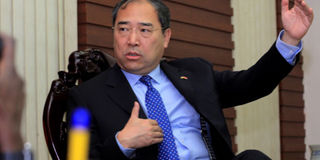Prime
China defends Huawei in phone hacking claims

Chinese ambassador to Uganda Zheng Zhu Qiang during an interview at the embassy in Kololo, Kampala, yesterday. Photo by Rachel Mabala
Chinese ambassador to Uganda Zheng Zhu Qiang has denied allegations that a Chinese telecom giant, Huawei, is working with Ugandan security to spy on Opposition politicians in the country.
The Wall Street Journal on Tuesday published a story that Huawei has been helping Ugandan security officials to spy on Opposition politicians by hacking into their cellular phone communication systems.
The report says Huawei experts are embedded within the security team offering technical support in hacking into the phone data of opposition political leaders, journalists, human rights activists and people the government deems a threat to it.
Speaking at the Chinese embassy in Kampala yesterday, Mr Zhu said the story is “a total fabrication” aimed at tarnishing the Chinese company’s reputation.
“None of the information in the article is true. In the article, there is actually detailed information and all the information is baseless. Huawei is well known and one of world’s biggest telecom companies. Huawei originates from China and we believe in Huawei and not in the article,” he said.
Mr Zhu also dismissed the article as fake news regarding the claim that one of China’s former diplomats to Kampala, Mr Chu Maoming, arranged a trip for Ugandan police officers to China and played a key role in securing a government deal for Huawei to install CCTV cameras in Uganda.
The story chronicled how Mr Maoming organised for the Ugandan officers internal trips within China and attended meetings where they were trained in IT to spy on Opposition politician Robert Kyagulanyi, aka Bobi Wine, and other leaders by tapping into their phone communication to obstruct their political activities.
Mr Zhu said during the alleged period of the trip, Mr Maoming had taken his annual leave, but abandoned it. He said the diplomat did not travel to China in 2017 and instead spent his entire leave period in Kampala.
“We know he arranged for leave but he abandoned it and spent the whole year here. That means the whole story is totally groundless. That is why we believe the Wall Street Journal story about Huawei and Chinese government is baseless and is totally fake news,” the ambassador said. He, however, could not explain why Mr Maoming abandoned his official leave.
Mr Zhu said the investigations about Huawei is part of a global campaign to kill its businesses and other Chinese technologies which are proving superior.
He said it has never been a secret that Huawei has faced resistance from “some big power” and that the axis is extending to Africa, especially Uganda, because Chinese products enjoy almost unrivalled reception in the country.
“Recently, Huawei has been targeted by some big power accusing Huawei of spying or being a security threat to some “big power” and that big power extended that to other countries not to use its products. So this article is a new attempt to attack Huawei and to demonise Huawei’s reputation,” Mr Zhu said.
He said the government of China had requested for evidence from the “big power” to show that the company is a security threat but no proof has ever been presented. He did not name the “big power” but added that the axis of fighting Chinese products seems to be gaining root in Uganda.
“For the past years, some country said Huawei is a security threat, but up to now, they don’t give evidence. Now they say they have evidence from Uganda which is totally untrue. Huawei is not only attacked here but also in other places. Huawei is a popular target,” Mr Zhu claimed.
The article republished in Daily Monitor yesterday stated that some time last year when Bobi Wine returned from a trip to the US with US backing for his opposition movement, Uganda’s cyber surveillance unit was under strict instructions to penetrate his WhatsApp and Skype communication using spyware developed by an Israeli company but failed after several days of trying. They then sought help from Huawei staff working in Uganda. Huawei is Uganda’s top digital supplier.
Huawei responds
Huawei dismissed the allegations as a fabrication. “Huawei completely rejects the Wall Street Journal’s unfounded and inaccurate allegations against its business operations in Uganda,” it stated yesterday.
The company said its code of business conduct prohibits any employees from undertaking any activities that would compromise their customers or end users’ data or privacy or that would breach any laws.
“Huawei prides itself on its compliance with the local laws and regulations in all markets where it operates and will defend its reputation robustly in the face of such baseless allegations. Huawei Technologies (Uganda) Co Ltd is a private entity, duly registered and licensed to conduct the business of information and communication technologies in Uganda. Compliance with local, regional and international laws is central to our business delivery. In particular; cyber security and privacy protection are Huawei’s top priorities,” the company stated.
Huawei denied any secret arrangements with Uganda’s security agencies and said the only partnership they have with government is installation of surveillance cameras.
“Uganda Police CCTV project is the only security-related project we have in Uganda whose scope is installing CCTV cameras, network, project command and data centre for specifically public security surveillance and identification of criminal activities. The training, therefore, we offer police officers is only how to manage the CCTV system,” Huawei said.



